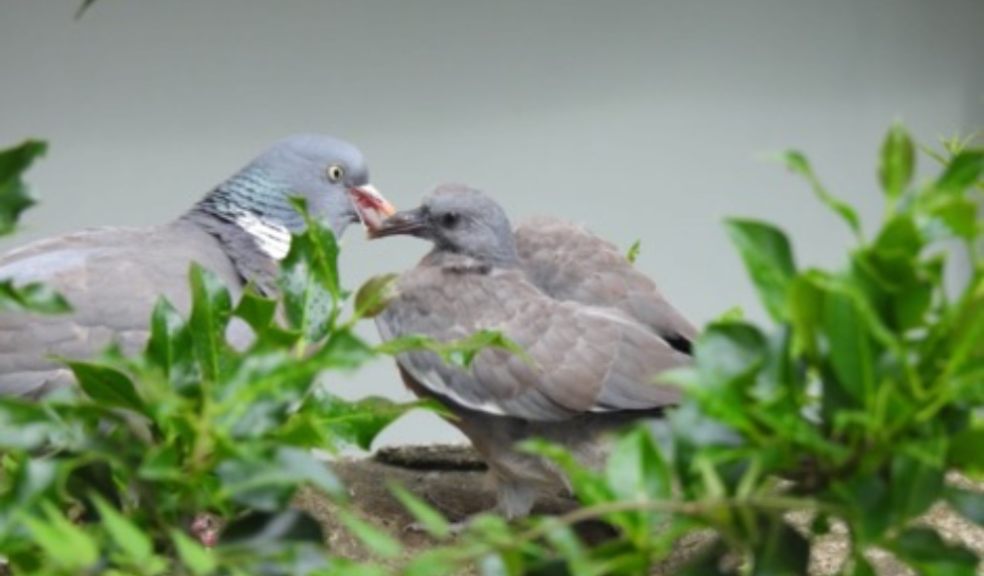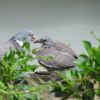
What to do if you find a baby bird
Photo Credit: Pigeon Squab being fed by parent bird by Sara Humphrey
Morwenna Alldis, spokesperson for the RSPB said: “At this time of year we get hundreds of calls from caring members of the public about the helpless baby birds they’ve discovered on the ground. But most of the time it’s important that we resist the urge to ‘rescue’ the baby bird, as tempting as it may be, this flightless period is a natural part of the bird’s development.
“Just before baby birds are ready to tentatively extend a wing, wiggle a tail feather and take flight for the first time, they leave their nest or “fledge” as it’s called. The fledglings will appear fully feathered and hop around your garden in broad daylight, unable to fly and may appear like they need rescuing. Fledglings need two-three days on the ground and around the nest to grow their final flight feathers, and then suddenly, they’re off taking to the skies.
Morwenna continued: “Another common fear is that the fledgling has been deserted by its parents. But fledglings are extremely unlikely to be abandoned and should be fed throughout the fledging period. Mum and dad are probably gathering food or hiding nearby with a beady eye on their young, waiting for you to leave. Parents know best and are the experts in rearing their young. Removing a fledgling from the wild significantly reduces its chances of long-term survival – so please don’t accidentally kidnap the baby bird, even in a well-meaning way.”
There are just a few situations when the public should lend a friendly helping hand:
Immediate Danger: If the baby bird is found on a busy road or path, and if it is safe to do so, we advise it is picked up and moved a short distance to a safer place - this must be within hearing distance of where the fledgling was found. Similarly, if you discover your cat or dog eyeing up a fledgling, we recommend that you keep your domestic pet indoors as much as possible
Injury: If the fledgling is injured or caught by a cat, the quickest way to get it medical help is often taking it to your local vets, most treat wild birds for free but do call ahead first. You could also contact your local wildlife rescue centre, found here: helpwildlife.co.uk/ Or call the RSPCA on: 0300 1234 999.
Nestlings: If a baby bird is discovered on the ground that is either unfeathered or covered only in its fluffy nestling down, it has likely fallen out of its cosy nest ahead of schedule. Very occasionally it is possible to put these babies back in their nest, but only if you are 100% sure of the nest it has fallen from. If not, please give the RSPCA a call on the above number or contact your local wildlife rehabilitation centre.
Grounded Swift
For full guidance, visit here: bit.ly/GroundedSwift
Barn Owl owlet
If found on the floor, first confirm it is a Barn Owl not Tawny Owl. Barn Owl owlets have a white, heart-shaped face and brown eyelid edges. More infor from The Barn Owl Trust here: bit.ly/BarnOwlTrust . Note the exact location where you found it. It is not normal for young Barn Owls to be out of the nest before they can fly, if left they will likely be ignored by their parents and not survive. Contact a local rescuer, the Barn Owl Trust or the RSPCA to help.
Broken House Martin or Swallow nests
If you find a nest that has fallen with chicks in, you can use a shallow ice cream or margarine tub with some drainage holes in the base, or a low plastic flowerpot will work too. Place as much of the old nest inside the container with some hay and put the chicks inside. Place the nest as high up as possible, but if you can’t place the new nest under the eaves, you’ll need to put some sort of lid on it to keep the worst of the weather out. The parents should hear the chicks and continue feeding them, but if they don’t, they will need to be cared for by a wildlife rehabilitator.
Occasionally, a parent bird will intentionally eject a chick from the nest if they sense it has an underlying health problem or is dying. It’s a harsh truth to stomach, as humans we want to fix things, but sometimes we need to allow the law of nature to run its course.
Please note there is a currently an Avian Flu Outbreak across the UK. Whilst we do not wish to scare anyone reading this, please consider the following before acting on the welfare information above. Although the risk to Humans is low, we advise avoiding all contact with wild birds, especially sick or dead birds. However, we understand that there will be times a baby or injured bird will need help. If you need to handle a bird, please wear impermeable gloves, and wash your hands thoroughly immediately after handling the bird. For further advise and the most up to date information see DEFRA (England & Wales) website here, Scotland here and Northern Ireland here .
How you can help this summer
Morwenna says: “So many people are passionate about nature and want to do their bit to help, here are our top four tips on how to do just that this summer.”
- Watch Your Step: Over half of England’s most threatened breeding birds nest on or near the ground. When out exploring nature, please follow the Countryside Code by keeping to footpaths, adhering to any signs flagging ground nesting birds, and keeping dogs on leads. By watching your step this breeding season, you can help save the lives of some very vulnerable feathered friends. Some ground nesting farmland birds will also have two-three broods and you may still see fledglings into September. So when enjoying your staycation this summer please take care to watch your step.
- Make a Splash for Nature: Installing a mini pond in your garden, even a washing-up bowl on a small balcony, will do wonders for your local wildlife, including frogs and toads, dragonflies, pond skaters, water lice, birds bathing – even bees get thirsty. Ponds are the easiest way to quickly increase the biodiversity of your green space. Birds and other garden wildlife especially need water during the summer months when natural sources may dry up. A birdbath or a shallow dish filled with water, with some stones inside for perching, will really help them out.
- Build a Hedgehog Café: With the UK population of hedgehogs declining alarmingly, it’s vital that we give our prickly friends a home in our gardens. Feed the hungry hogs in your garden to help them build energy for raising hoglets, and fat reserves for their long winter hibernation.
- Grow Plants for Caterpillars: Butterfly caterpillars are fussy feeders and adult butterflies only lay their eggs on one or two types of plants, which they know their caterpillars eat. By growing the right plants for the caterpillars in your area you can boost the population of adult butterflies. Having lots of plant variety in your garden will give the best chance of increasing butterfly populations.
To find out more about helping the nature on your doorstep, visit: rspb.org.uk/natureonmydoorstep














